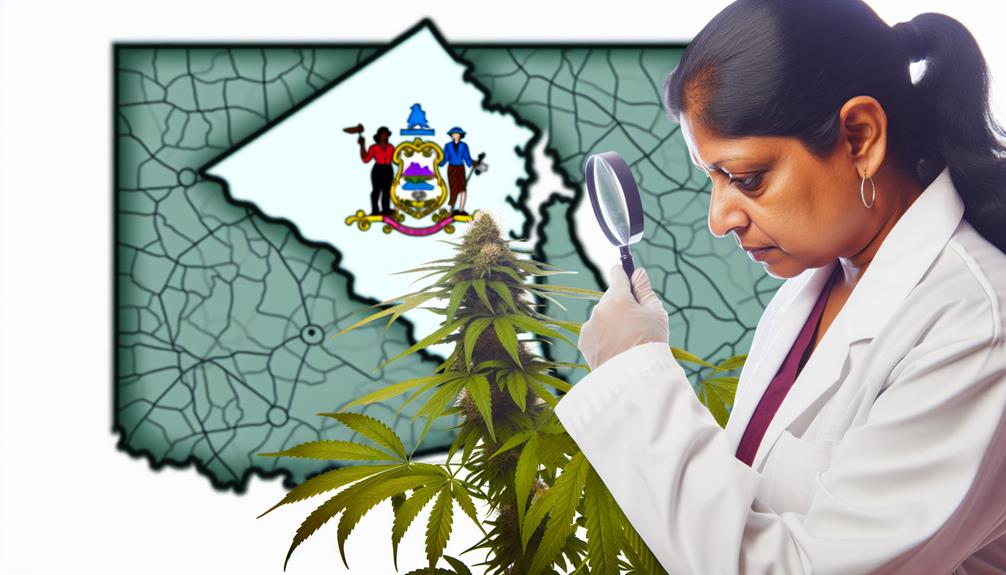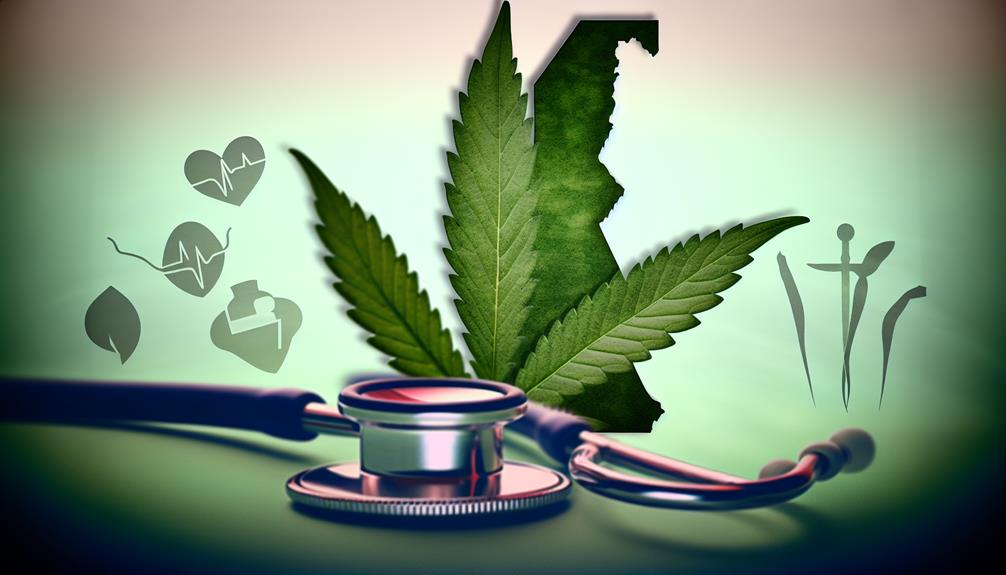Did you know that Delaware continues to be one of the leading states in the U.S. pioneering the use of medical marijuana for patients with chronic illnesses? Since legislation passed in 2011, there has been a significant increase in registered patients benefiting from this alternative treatment. But how exactly is it improving their quality of life, you might wonder? In addition, what implications does it have for the future of healthcare in the state? There’s more to this story than first meets the eye.
Table of Contents
Understanding Medical Marijuana

Medical marijuana, also known as medicinal cannabis, is a term you’ve likely heard before. But what exactly does it mean and how does it differ from any other form of marijuana?
At its core, medical marijuana refers to the use of cannabis strains specifically chosen for their therapeutic effects. It’s not just about getting ‘high’; it’s about serving a medical need.
Cannabis strains used in medical marijuana are carefully selected based on their chemical makeup, specifically focusing on the balance of cannabinoids—compounds unique to the cannabis plant.
These cannabinoids, mainly THC and CBD, interact with your body’s endocannabinoid system influencing various physiological processes. THC can offer pain relief and reduce nausea while CBD can help with inflammation, seizures and anxiety.
Understanding these therapeutic effects and potential benefits is essential for those in healthcare sector especially those serving individuals with chronic or debilitating conditions.
This isn’t about promoting drug use; rather it’s about exploring every avenue to improve patient care and quality of life.
Legalization Timeline in Delaware

In the past decade, attitudes towards medical marijuana have significantly shifted in the United States, and Delaware was no exception. As you explore this historical overview, you’ll see a series of legislative challenges and triumphs that have led to the current landscape.
- In 2011, Delaware became the 16th state to legalize medical marijuana when Governor Jack Markell signed the Delaware Medical Marijuana Act into law.
- However, due to concerns over potential federal intervention, the program faced delays. It wasn’t until 2014 that the state’s first dispensary opened.
- More recently, in 2019, amendments were made to the Delaware Medical Marijuana Act allowing nurse practitioners and physician assistants to recommend medical marijuana.
These milestones depict a progressive journey towards embracing medical marijuana in the state. The legislative challenges faced weren’t easy but were necessary steps in pursuing compassionate healthcare. This timeline reflects not just policy change but also a shift in societal attitudes towards an alternative form of treatment.
Understanding this journey is essential for providing effective and empathetic care as we serve others in this new era.
Benefits for Patients

While the history of medical marijuana in Delaware is complex, it’s the potential health benefits for patients that truly underscore its importance. It’s not just about pain management, although that’s a significant aspect. It’s also about anxiety relief and offering a lifeline to those tackling the debilitating effects of chronic illness.
Medical marijuana acts as a bridge to alternative therapies, offering holistic healing in a world where traditional medicine often falls short. The reduction in stigma and empowerment of patients are truly driving this shift.
As acceptance of medical marijuana increases, so too does understanding that this natural remedy can dramatically enhance the quality of life for those who need it most.
Medical marijuana isn’t just about giving patients another option; it’s about giving them hope. It acknowledges the value of different approaches to health and wellness.
It breaks down barriers and builds up patient empowerment. Ultimately, it enhances the quality of life for individuals seeking relief from pain, anxiety, and hardships associated with chronic illness.
Qualifying Conditions

Bearing in mind the multitude of benefits medical marijuana can provide, it’s important to understand who qualifies for its use in Delaware. Patient eligibility and condition criteria are essential aspects when understanding this complex issue.
- The first eligibility criterion is diagnosis. You must be diagnosed with one of the qualifying conditions as defined by Delaware law. These conditions range from chronic illnesses such as cancer, HIV/AIDS, multiple sclerosis to mental health conditions such as PTSD and severe anxiety.
- Next, it’s not enough to simply have a diagnosis; your condition must also be severe enough to interfere with daily activities. This means that the symptoms of your condition limit or prevent you from performing tasks that most people can do with ease.
- Finally, you must have tried other treatments that have proved ineffective. Medical marijuana is typically considered a last resort when conventional treatments haven’t provided sufficient relief.
Obtaining Medical Marijuana

After securing a diagnosis for a qualifying condition, you’ll need to navigate the process of obtaining medical marijuana in Delaware. The application process is methodical and involves several steps.
First, you’ll need to obtain written certification from a certified physician who has diagnosed you with a qualifying condition. This certification verifies your medical need for marijuana and is a critical document for your application.
Next, fill out the application form provided by the Delaware Department of Health and Social Services (DHSS). The form requires detailed personal, medical, and caregiver information. You’ll also need to pay an application fee.
Speaking of caregivers, it’s crucial to understand that Delaware allows patients to designate one. This individual can assist in acquiring, possessing and administering your medical marijuana. Caregivers must be 21 years or older and should not have any felony convictions involving drugs.
Once your application is approved by DHSS, you’ll receive a registry ID card allowing you to purchase medical marijuana from state-licensed dispensaries.
Patient Rights and Regulations

Having walked through the process of obtaining medical marijuana, it’s equally essential to understand your rights as a patient and the regulatory framework surrounding this alternative treatment in Delaware. As a patient, your privacy is paramount. Delaware law protects patient privacy by keeping all patient records confidential.
- Patient privacy: Delaware law mandates that all patient records related to the use of medical marijuana are confidential and can’t be disclosed without your consent. You’re protected under the Health Insurance Portability and Accountability Act (HIPAA), which guarantees your medical information remains private.
- Legal protections: Delaware law protects registered medical marijuana patients from being penalized for lawful use and possession of medical marijuana. You won’t face discrimination regarding employment, child custody or housing due to your medical marijuana use.
- Regulatory compliance: Delaware’s medical marijuana program operates under strict regulations. These regulations ensure safe access to medical marijuana for legitimate patients while preventing misuse.
Understanding these rights and regulations not only empowers you as a patient but also helps maintain the integrity of Delaware’s medical marijuana program.
Economic Impact in Delaware

Exploring the economic impacts, it’s clear that medical marijuana has greatly influenced Delaware’s economy. The economic growth seen since its legalization is staggering. As you investigate the figures, it becomes apparent that a significant portion of the state’s tax revenue now comes from this burgeoning industry.
You’ve probably noticed job creation too, right? It’s not just growers and dispensary workers. There’s a ripple effect leading to new opportunities in areas you might not expect like security, legal services and real estate.
The market expansion has also spurred innovation in agricultural technologies and methods contributing to a more sustainable and efficient industry.
Don’t overlook the tourism boost either. Many are traveling from states where medical marijuana isn’t yet legal injecting money into local businesses and further stimulating economic growth.
Perhaps the most profound impact lies in healthcare savings. By providing an alternative treatment option, medical marijuana can help reduce healthcare costs leading to significant savings for both patients and the state’s healthcare system.
Putting everything into perspective, it’s clear that the economic impacts of medical marijuana reach far beyond just the plant itself.
Future Prospects

Looking into the future, it’s clear that prospects for medical marijuana in Delaware are promising. With ongoing advocacy strategies, research developments and growing acceptance, the landscape is positively shifting for patients.
- Advocacy Strategies: Expect a rise in patient-focused initiatives aiming to remove stigma associated with medical marijuana.
Advocacy groups will work with lawmakers to refine regulations ensuring patients have safe, legal access to their medicine. - Research Developments: Expect breakthroughs in medical marijuana research.
Scientists are constantly discovering new therapeutic uses for this plant. As further research validates the efficacy of medical marijuana, it’ll support its acceptance and use in the medical community. - Growing Acceptance: Expect continued growth in the acceptance of medical marijuana not only among patients and healthcare providers but also in the general public.
This acceptance will be a catalyst for expansion of medical marijuana policies and practices.
Patient Stories and Experiences

As we consider the bright future of medical marijuana in Delaware, it’s important to ground our discussion in the lived experiences of those directly impacted by it.
Patient accounts and personal journeys offer invaluable insight into the profound benefits of this treatment. For instance, consider a middle-aged woman suffering from chronic pain due to fibromyalgia. Traditional pain medication was barely effective, and side effects were crippling. However, with medical marijuana she found a level of relief she hadn’t experienced in years. Her personal journey is a testament to the transformative power of this alternative therapy.
There’s also an account from a war veteran battling PTSD. The nightmare of his condition was all-consuming. Conventional treatments fell short but medical marijuana brought him hope. He could sleep again, engage with others and start rebuilding his life.
These stories aren’t isolated instances; numerous patients echo similar experiences highlighting efficacy of medical marijuana in managing a range of conditions.
These stories underscore the need for continued research and advocacy. As you serve others in this field, remember these accounts and personal journeys. They’re the heart and soul of the medical marijuana movement in Delaware.
Conclusion
In the grand tapestry of healthcare, medical marijuana has revolutionized Delaware’s landscape offering a lifeline to countless patients. It’s not just a game-changer; it’s an absolute revelation. Your life can be transformed with pain and anxiety greatly reduced. With clear regulations and increasing acceptance, medical marijuana isn’t just an alternative treatment—it’s a beacon of hope. The future is bound to bring more breakthroughs further enriching Delaware’s medical field and patient experience.
If you’re curious about how medical marijuana might benefit you or a loved one, we warmly invite you to visit Cannabis Docs of Delaware. Our team is here to help, and we’d love to hear from you. Feel free to give us a call at (855) 420-6797. We’re excited to share more about this transformative journey and answer any questions you might have!

